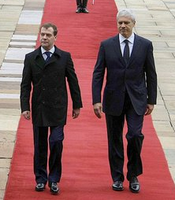After years as a sidelined figure on the European political stage, Serbia is now attracting growing attention from both West and East.
While continuing to line up its bid for European Union membership, Serbia is also the focus of Russia's renewed interest in the Balkans. In October, Belgrade signed deals with Moscow that include support for a controversial oil pipeline, a generous loan deal and the establishment of a Russian base in Serbia that has the potential for military use. Some even see Serbia's deepening ties with Russia as inimical to its pro-Western stance. But for the time being, Serbia's canny government is strengthening its own position through what amounts to a balancing act.
The re-election of Serbian President Boris Tadic in February 2008, and the parliamentary victory of the coalition led by his Democratic Party (DS) in May of the same year, were seen as clear signs of Serbian enthusiasm for entering the European mainstream -- after years of being either on the periphery or entirely excluded as a result of its role in the bloody wars following Yugoslavia's collapse.

